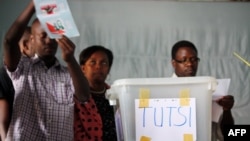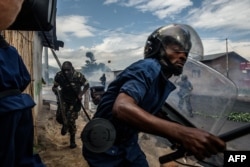The U.N. Committee Against Torture warns acts of violence and incitement to hatred against the ethnic Tutsi minority in Burundi could develop into genocide. The committee has just issued its concluding observations on its examination of Burundi’s implementation of the Convention Against Torture.
During its three-week session, the UN Committee Against Torture examined three regular reports submitted by Kuwait, Honduras, and Mongolia. The committee also addressed a special report from Burundi.
Reports of torture
Chair of the Committee, Jens Modvig, says it had requested Burundi submit a special report due to a number of worrying developments in the country. He tells VOA the committee has received information that reports of violence and torture are politically and ethnically motivated.
“I would like to mention also that the secretary-general’s special advisor on the prevention of genocide has expressed preoccupation that we are in an early stage of something that could develop towards genocide…But, you could consider that systematic torture directed towards certain political and ethnic groups could be an early warning sign of a process that could deteriorate into genocide.”
Deadly protests broke out in the capital, Bujumbura, in April 2015, following President Pierre Nkurunziza’s bid for a third term in office. Since then, the U.N. refugee agency reports some 275,000 people have fled to neighboring countries in search of refuge.
Committee member Sebastien Touze says the government of Burundi has committed serious violations of people's fundamental rights. He says members are particularly concerned by the many extrajudicial killings, including those of political opponents.
Touze cites many cases of enforced disappearances, widespread torture, and numerous allegations of sexual violence against women. He says the Imbonerakure, a youth militia allied with the government, reportedly commits acts of murder, torture and other violence with total impunity. He says no investigations of cases of abuse have taken place.
The Burundian government sent a high-level delegation to present the report. But, the committee notes the delegation failed to show up on the second day to reply to a series of pressing questions. It says this is the first time that has ever happened in the history of the committee.





